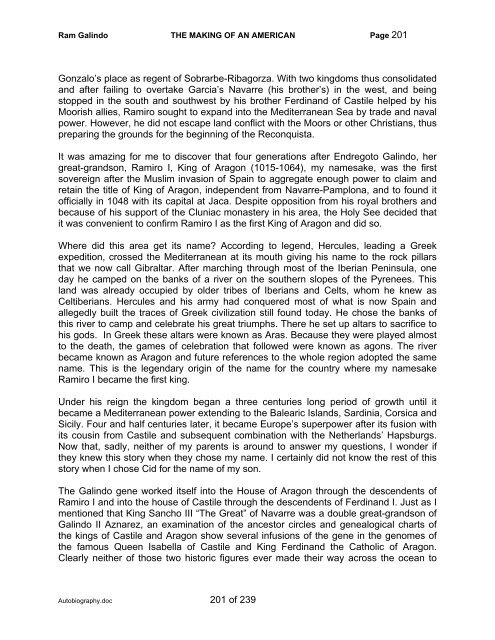Autobiography - The Galindo Group
Autobiography - The Galindo Group
Autobiography - The Galindo Group
Create successful ePaper yourself
Turn your PDF publications into a flip-book with our unique Google optimized e-Paper software.
Ram <strong>Galindo</strong> THE MAKING OF AN AMERICAN Page 201<br />
Gonzalo’s place as regent of Sobrarbe-Ribagorza. With two kingdoms thus consolidated<br />
and after failing to overtake Garcia’s Navarre (his brother’s) in the west, and being<br />
stopped in the south and southwest by his brother Ferdinand of Castile helped by his<br />
Moorish allies, Ramiro sought to expand into the Mediterranean Sea by trade and naval<br />
power. However, he did not escape land conflict with the Moors or other Christians, thus<br />
preparing the grounds for the beginning of the Reconquista.<br />
It was amazing for me to discover that four generations after Endregoto <strong>Galindo</strong>, her<br />
great-grandson, Ramiro I, King of Aragon (1015-1064), my namesake, was the first<br />
sovereign after the Muslim invasion of Spain to aggregate enough power to claim and<br />
retain the title of King of Aragon, independent from Navarre-Pamplona, and to found it<br />
officially in 1048 with its capital at Jaca. Despite opposition from his royal brothers and<br />
because of his support of the Cluniac monastery in his area, the Holy See decided that<br />
it was convenient to confirm Ramiro I as the first King of Aragon and did so.<br />
Where did this area get its name? According to legend, Hercules, leading a Greek<br />
expedition, crossed the Mediterranean at its mouth giving his name to the rock pillars<br />
that we now call Gibraltar. After marching through most of the Iberian Peninsula, one<br />
day he camped on the banks of a river on the southern slopes of the Pyrenees. This<br />
land was already occupied by older tribes of Iberians and Celts, whom he knew as<br />
Celtiberians. Hercules and his army had conquered most of what is now Spain and<br />
allegedly built the traces of Greek civilization still found today. He chose the banks of<br />
this river to camp and celebrate his great triumphs. <strong>The</strong>re he set up altars to sacrifice to<br />
his gods. In Greek these altars were known as Aras. Because they were played almost<br />
to the death, the games of celebration that followed were known as agons. <strong>The</strong> river<br />
became known as Aragon and future references to the whole region adopted the same<br />
name. This is the legendary origin of the name for the country where my namesake<br />
Ramiro I became the first king.<br />
Under his reign the kingdom began a three centuries long period of growth until it<br />
became a Mediterranean power extending to the Balearic Islands, Sardinia, Corsica and<br />
Sicily. Four and half centuries later, it became Europe’s superpower after its fusion with<br />
its cousin from Castile and subsequent combination with the Netherlands’ Hapsburgs.<br />
Now that, sadly, neither of my parents is around to answer my questions, I wonder if<br />
they knew this story when they chose my name. I certainly did not know the rest of this<br />
story when I chose Cid for the name of my son.<br />
<strong>The</strong> <strong>Galindo</strong> gene worked itself into the House of Aragon through the descendents of<br />
Ramiro I and into the house of Castile through the descendents of Ferdinand I. Just as I<br />
mentioned that King Sancho III “<strong>The</strong> Great” of Navarre was a double great-grandson of<br />
<strong>Galindo</strong> II Aznarez, an examination of the ancestor circles and genealogical charts of<br />
the kings of Castile and Aragon show several infusions of the gene in the genomes of<br />
the famous Queen Isabella of Castile and King Ferdinand the Catholic of Aragon.<br />
Clearly neither of those two historic figures ever made their way across the ocean to<br />
<strong>Autobiography</strong>.doc 201 of 239


